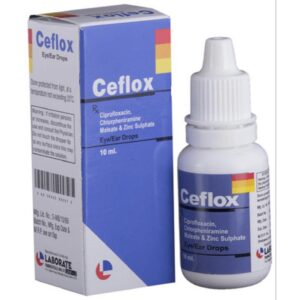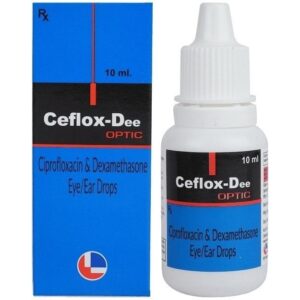CIPROFLOXACIN + CHLORPHENARAMINE MALEATE + ZINC SULFATE
Ciprofloxacin: Ciprofloxacin is a fluoroquinolone antibiotic commonly used to treat a wide range of bacterial infections. It is available in both oral and intravenous forms. It exhibits its bactericidal effects by inhibiting the bacterial DNA gyrase, which is responsible for DNA replication and repair.
The drug is primarily used to treat respiratory tract infections, urinary tract infections, skin and soft tissue infections, gastroenteritis, sexually transmitted infections, and bone and joint infections.
The dosage of ciprofloxacin varies depending on the type and severity of the infection. It is usually recommended to take 250-750 mg of the oral form twice a day for 7-14 days. Intravenous doses may vary based on the specific indication.
While ciprofloxacin is generally well-tolerated, it can have some side effects. Common side effects include nausea, diarrhea, abdominal pain, headache, and dizziness. It can also cause tendonitis or tendon rupture, particularly in the Achilles tendon, so caution is advised in patients at higher risk such as the elderly or those on concurrent corticosteroid therapy. Other rare, but serious side effects include allergic reactions, liver toxicity, and nervous system disturbances such as seizures or hallucinations.
It’s important to note that ciprofloxacin should be used with caution in children, pregnant women, and individuals with a history of epilepsy, myasthenia gravis, or liver or kidney problems. Additionally, ciprofloxacin may interact with other medications, so it’s essential to inform your healthcare provider of any other drugs you are taking.
Overall, ciprofloxacin is an effective broad-spectrum antibiotic that plays a crucial role in the treatment of various bacterial infections. It is important to follow the prescribed dosage and duration of treatment to ensure effective and safe use.
Chlorphenaramine Maleate: Chlorpheniramine Maleate is an antihistamine medication primarily used to relieve symptoms associated with allergies, such as hay fever, allergic rhinitis, and hives. It is sold under various brand names, including Chlor-Trimeton and Aller-Chlor.
Mechanism of Action: Chlorpheniramine Maleate works by blocking the effects of histamine, a substance released by the body during an allergic reaction. It binds to histamine H1 receptors, preventing histamine from attaching to cells and causing symptoms like sneezing, itching, watery eyes, and a runny nose.
Dose and Administration: The typical recommended dose for adults and children 12 years and older is 4 mg to 8 mg every 4 to 6 hours, not exceeding 32 mg in 24 hours. For children aged 6 to 12 years, the usual dose is 2 mg every 4 to 6 hours, not exceeding 12 mg in 24 hours. The dose may vary depending on the individual and the specific condition being treated. It is available in various forms, including tablets, capsules, syrups, and oral solutions.
Side Effects: Common side effects of Chlorpheniramine Maleate may include drowsiness, dizziness, dry mouth, blurred vision, constipation, and urinary retention. These effects are more likely to occur with higher doses. Some people may also experience paradoxical reactions, such as restlessness, irritability, or difficulty sleeping. Serious side effects are rare but can include allergic reactions, irregular heartbeat, difficulty breathing, and hallucinations. It is important to consult a healthcare professional if any concerning symptoms arise.
It’s worth noting that Chlorpheniramine Maleate may have interactions with other medications, including sedatives, tranquilizers, and medications that depress the central nervous system. There may also be a risk of overdose if taken with other antihistamines. It is important to consult with a healthcare professional or pharmacist before taking any new medications.
Zinc Sulfate: Zinc Sulfate is a medication that contains zinc in the form of sulfate. It is commonly used as a dietary supplement to provide the body with essential zinc, an important mineral involved in various biological processes.
Use: Zinc Sulfate is used to treat zinc deficiency and associated symptoms such as impaired immune function, slow wound healing, skin conditions, and growth retardation. It is also used as a preventive measure against zinc deficiency in certain conditions, including malabsorption disorders and chronic liver disease.
Mechanism of Action: Zinc is essential for the normal functioning of enzymes and plays a vital role in numerous cellular processes in the body. It is involved in DNA synthesis, cell division, protein synthesis, wound healing, immune system function, and antioxidant activity. Zinc Sulfate replenishes zinc levels in the body, allowing these processes to occur properly.
Dose: The recommended dose of Zinc Sulfate varies depending on the age, sex, and individual zinc requirements. Generally, for adults, a daily dose of 15-30 mg of elemental zinc is considered adequate. It is available in tablet, capsule, and liquid forms, with different strengths. It is important to follow the instructions provided by the healthcare professional or the dosage instructions on the product label.
Side Effects: Zinc Sulfate is generally well-tolerated when taken as recommended. However, some individuals may experience side effects such as nausea, vomiting, diarrhea, and stomach upset. These side effects are usually mild and go away on their own. In rare cases, an allergic reaction may occur, characterized by hives, rash, itching, swelling, dizziness, or difficulty breathing. If any such allergic reaction occurs, immediate medical attention should be sought.
It is important to note that excessive intake of zinc, above the recommended doses, can lead to adverse effects such as copper deficiency, impaired immune function, gastrointestinal disturbances, and metabolic imbalances. Therefore, it is essential to follow the recommended dose and consult with a healthcare professional before starting any new supplement regimen.


